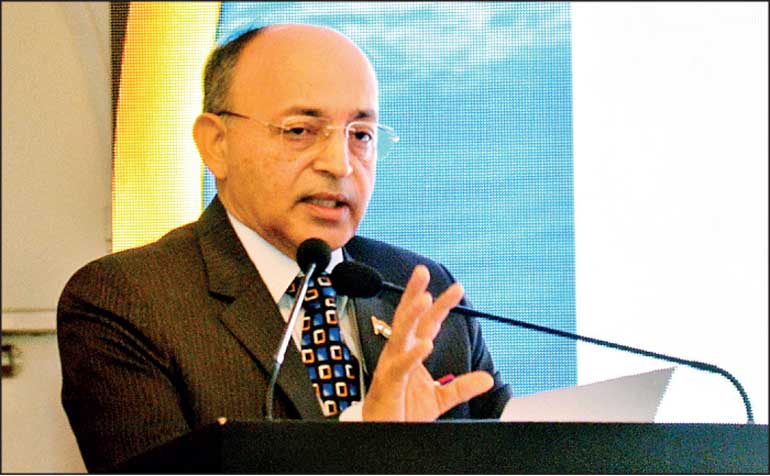Tuesday Feb 24, 2026
Tuesday Feb 24, 2026
Friday, 29 November 2024 00:38 - - {{hitsCtrl.values.hits}}

Indian Navy’s former Vice Admiral Anil Kumar Chawla
By Charumini de Silva
Indian Navy’s former Vice Admiral Anil Kumar Chawla on Tuesday delivered a compelling keynote address on the importance of maritime security and economic potential for Sri Lanka at the first-ever marine summit,‘Voyage Sri Lanka 2024: Sailing into the Blue Economy,’ organised by the Export Development Board (EDB).
He highlighted the island nation’s untapped opportunities in trade, tourism, fisheries, renewable energy and offshore services, whilst calling for a robust maritime security strategy to address emerging challenges.
Describing Sri Lanka as the ‘Pearl of the Indian Ocean,’ he underscored its strategic location along major international shipping routes. This advantageous position, coupled with an exclusive economic zone (EEZ) eight times its land area, he said is set to expand significantly upon finalising its continental shelf claim — offering immense opportunities in trade, fisheries, tourism, renewable energy and offshore services.
“Sri Lanka’s maritime economy, while vital, currently contributes below 10% of the country’s $ 84 billion Gross Domestic Product (GDP). Sectors such as logistics only contribute to 2.5%, boat exports 1.4%, fisheries 1.4%, and marine-based tourism a significant share of the 8% from tourism,” he said, noting that these figures fall short for an island nation with such inherent advantages.
However, Admiral Chawla pointed out that these opportunities also come with security and environmental challenges that must be managed effectively.
He highlighted Sri Lanka’s prime maritime location and educated workforce provide a strong foundation and called for a National Maritime Security Strategy to address threats to maritime safety, port security, and the environment while fostering economic growth.
“Maritime security is the backbone of a thriving marine economy,” he stressed.
Admiral Chawla opined Sri Lanka’s ability to flourish in this domain depends on designing a comprehensive strategy that balances opportunity with preparedness.
He said the Port of Colombo, already a leader in transhipment, handles 70% of India’s transshipment cargo. However, container throughput has stagnated at 7 million TEUs since 2018.
Admiral Chawla also noted that there is substantial potential for expansion into ship maintenance and bunkering and logistics services, with the Port of Hambantota poised to play a key role.
“Developing an indigenous merchant marine and shipbuilding industry could also address Sri Lanka’s negative trade balance in transport services,” he suggested.
In terms of fisheries, Admiral Chawla said it is considered a cornerstone of the country’s food security and economy. Nevertheless, he emphasised the need for better resource protection and improved fleet management to maximise productivity.
He highlighted that the maritime sector also offers significant opportunities for renewable energy through offshore wind and wave power as well as potential offshore oil and gas exploration.
Admiral Chawla was of the view that sustainable tourism, which heavily relies on the marine environment, required a focus on safety, security, and pollution control to balance development with ecological preservation.
He called for collaboration among stakeholders to unlock Sri Lanka’s maritime potential, ensuring that the island nation’s economic aspirations are achieved in a secure and sustainable manner.